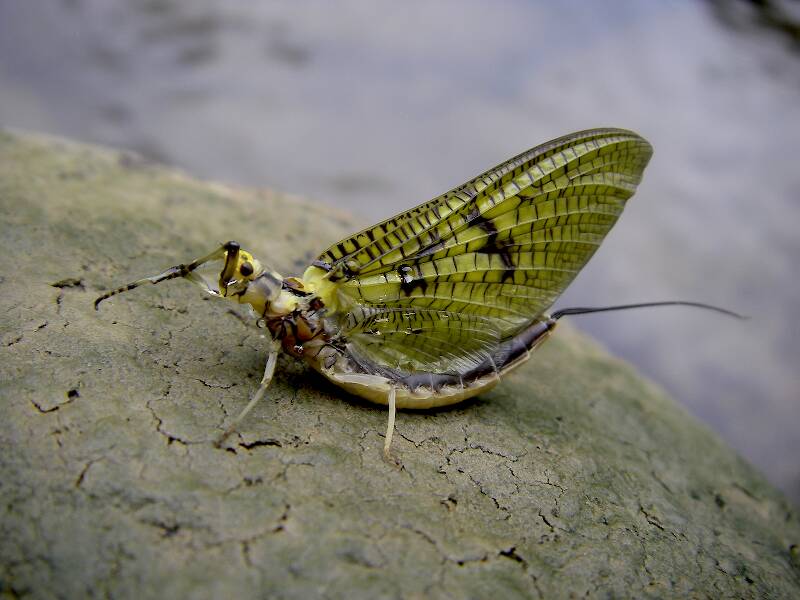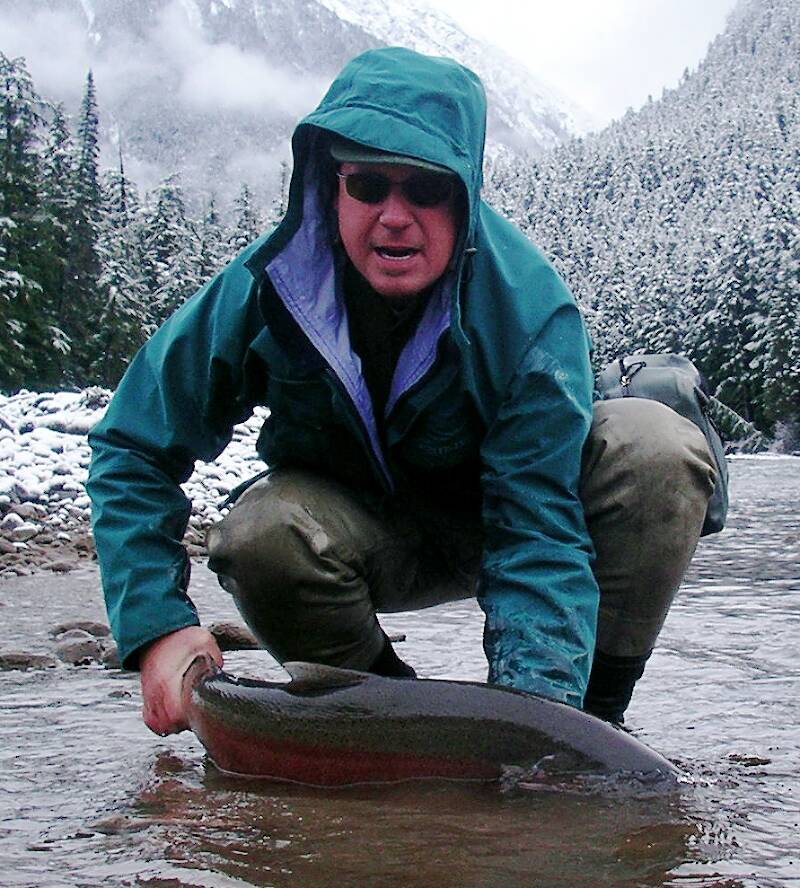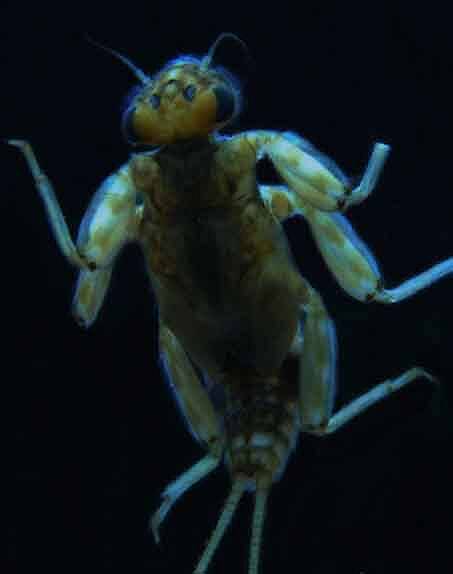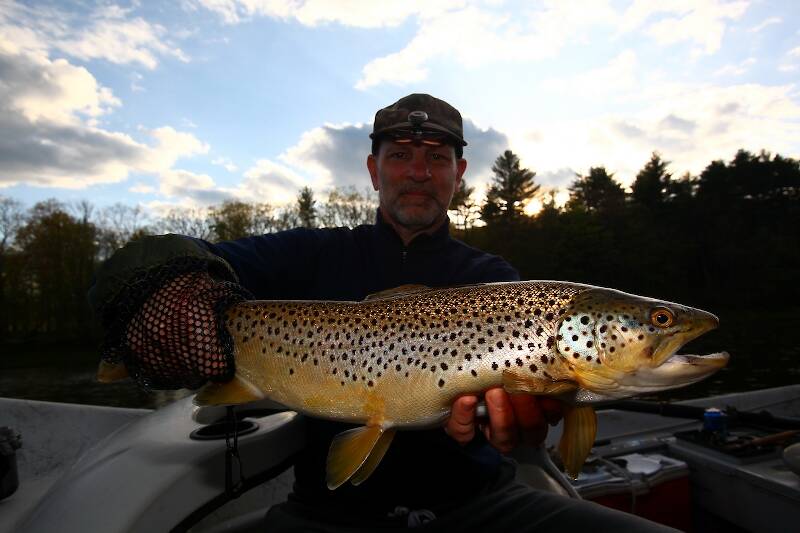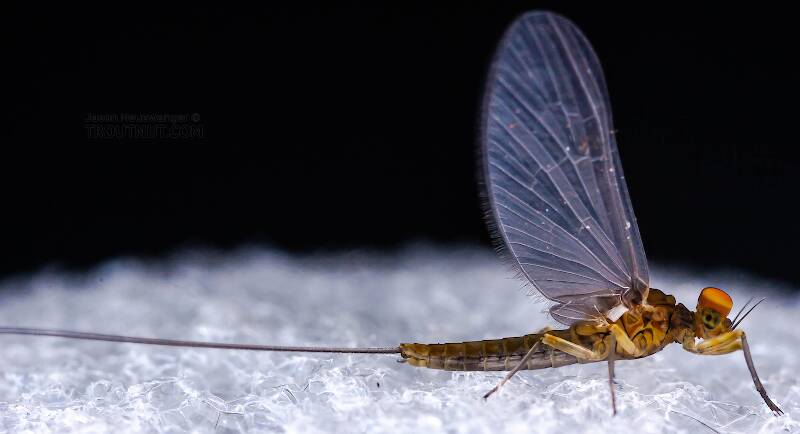
Blue-winged Olives
Baetis
Tiny Baetis mayflies are perhaps the most commonly encountered and imitated by anglers on all American trout streams due to their great abundance, widespread distribution, and trout-friendly emergence habits.
Featured on the forum
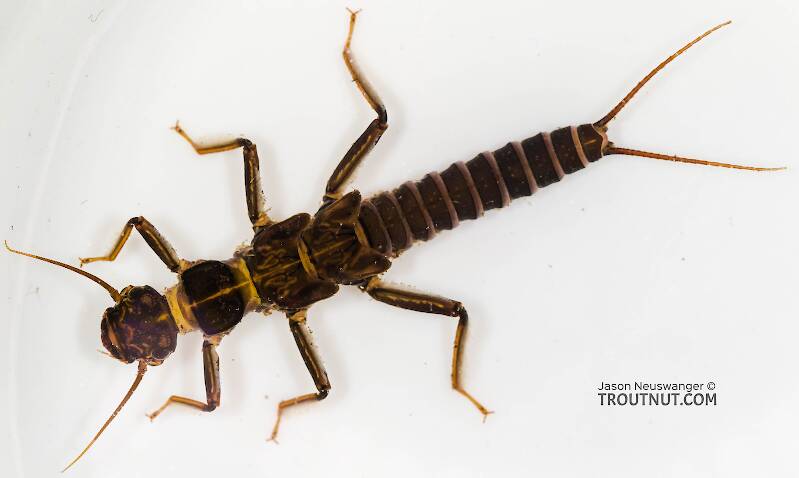
As far as I can tell, this species has only previously been reported from one site in Oregon along the Columbia gorge. However, the key characteristics are fairly unmistakable in all except for one minor detail:
— 4 small yellow spots on frons visible in photos
— Narrow occipital spinule row curves forward (but doesn’t quite meet on stem of ecdysial suture, as it's supposed to in this species)
— Short spinules on anterior margin of front legs
— Short rposterior row of blunt spinules on abdominal tergae, rather than elongated spinules dorsally
I caught several of these mature nymphs in the fishless, tiny headwaters of a creek high in the Wenatchee Mountains.
— 4 small yellow spots on frons visible in photos
— Narrow occipital spinule row curves forward (but doesn’t quite meet on stem of ecdysial suture, as it's supposed to in this species)
— Short spinules on anterior margin of front legs
— Short rposterior row of blunt spinules on abdominal tergae, rather than elongated spinules dorsally
I caught several of these mature nymphs in the fishless, tiny headwaters of a creek high in the Wenatchee Mountains.

Troutnut is a project started in 2003 by salmonid ecologist Jason "Troutnut" Neuswanger to help anglers and
fly tyers unabashedly embrace the entomological side of the sport. Learn more about Troutnut or
support the project for an enhanced experience here.
Crepuscular has attached these 5 pictures. The message is below.
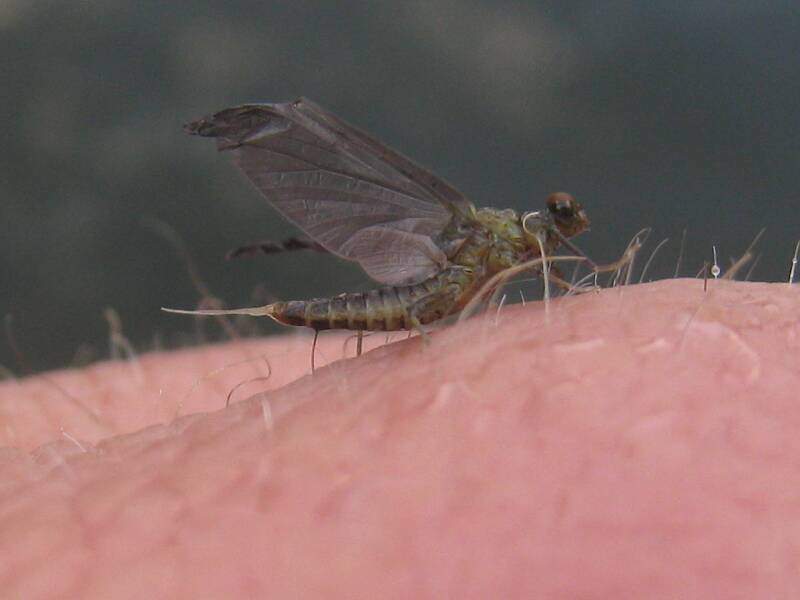
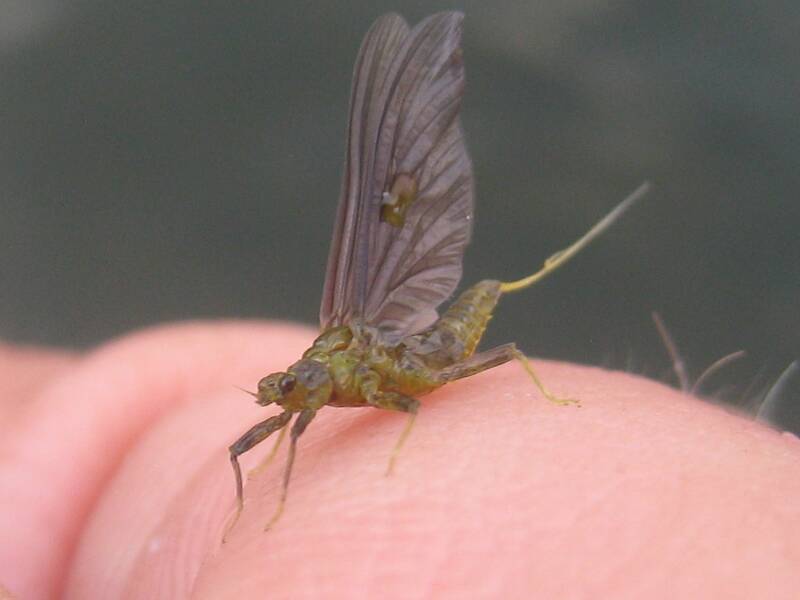
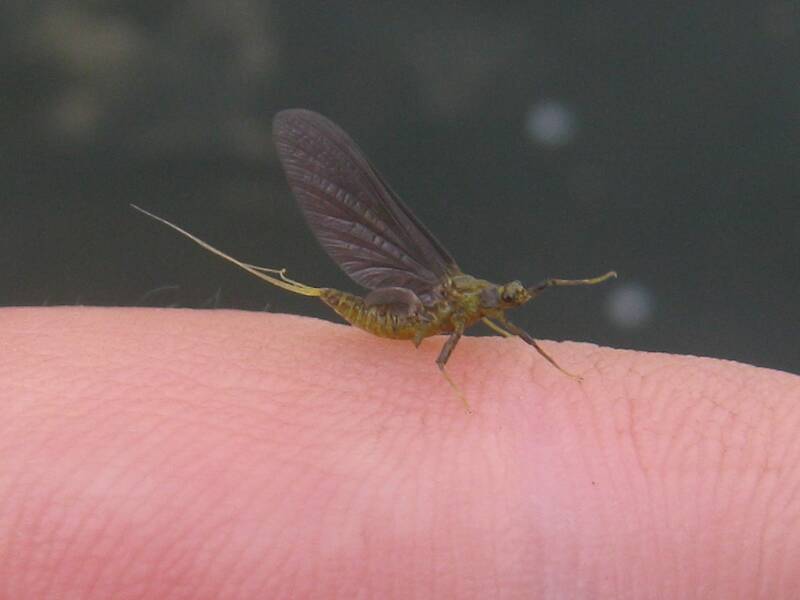
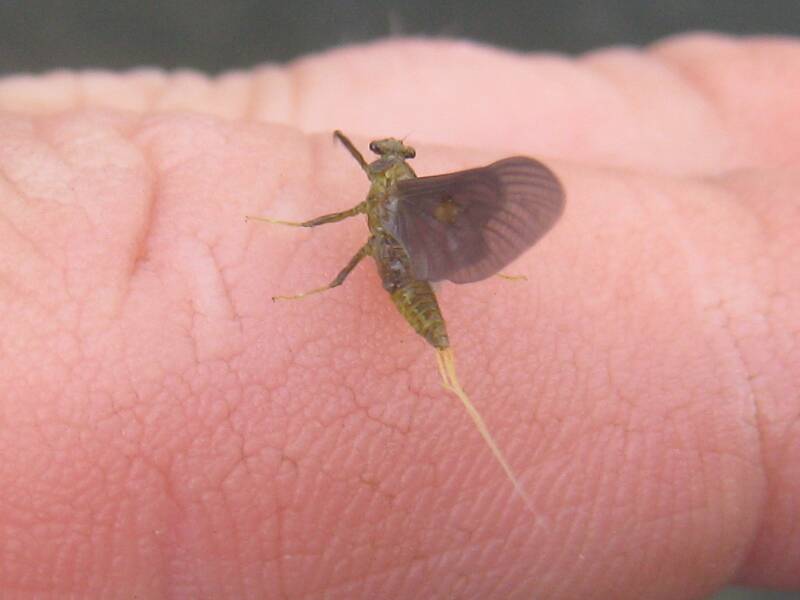
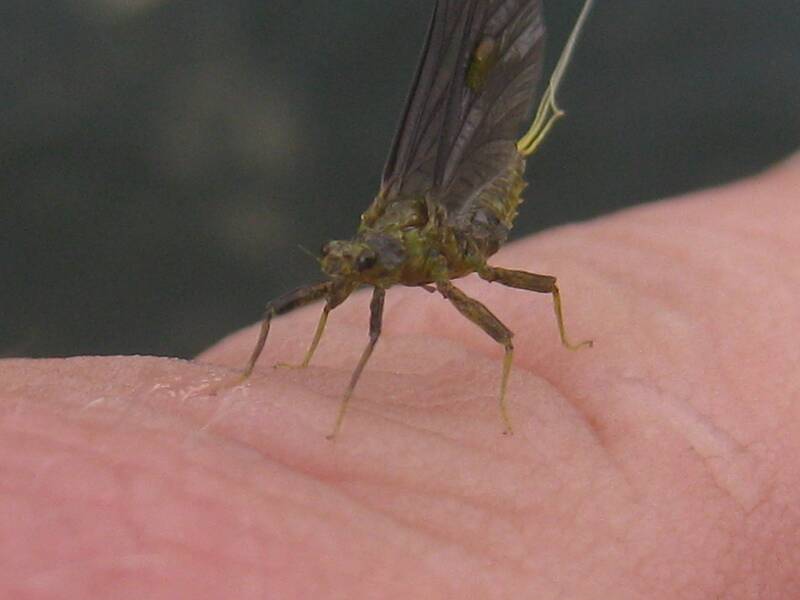
Crepuscular on May 27, 2012May 27th, 2012, 8:25 am EDT
Amazing fishing last Wed. Thursday and Friday. Sorry for the crappy pictures..
Entoman on May 27, 2012May 27th, 2012, 11:08 am EDT
They look like pretty small flies, Eric. What do you think, Drunella cornutella? Perhaps D. lata? The pale tails have me leaning towards lata.
"It's not that I find fishing so important, it's just that I find all other endeavors of Man equally unimportant... And not nearly as much fun!" Robert Traver, Anatomy of a Fisherman
Konchu on May 27, 2012May 27th, 2012, 4:47 pm EDT
...some prominent posterolateral projections on the abdominal segments are visible in some of my views...
Thought I'd chum the waters.
Thought I'd chum the waters.
Konchu on May 27, 2012May 27th, 2012, 4:52 pm EDT
any chance there are some coarse-sandy edgewaters around?
Crepuscular on May 27, 2012May 27th, 2012, 5:30 pm EDT
I think they were too big for lata or cornutella They were a solid size 16. Those projections are pretty obvious in the last photo. I was calling them cornutas on the water, but after seeing the photos I was too unsure to call them cornuta. There was all kinds of habitat around. Pine Creek is fairly large and has a lot of every type of habitat. There were thousands of spinners in the evenings. Even some hatching duns, which also made me less sure of cornuta. I don't remember seeing projections like that on cornutas.
Entoman on May 27, 2012May 27th, 2012, 7:40 pm EDT
Hmm... I was thinking the same only from the opposite direction. They are too small for cornuta, which are a good 14 to as large as size 12. I believe it's still safe to assume the following gleaned from older taxonomies:
Larger than 9mm - cornuta
Smaller than 8.5mm - cornutella or lata
Synonymizing longicornis with lata does complicate the size character a bit, but I think you're safe in that part of the country. My guess is that your specimens are substantially smaller than 8.5 mm which is the approx. shank length of the old Mustad 94840 #14 (the 94840 #16's measure slightly under 7mm).
Besides the size difference, cornuta (as well as cornutella) has pale caudals with obvious brown bands at the segmental joinings (making them appear darker in the hand). This character appears to be lacking in your photos as far as I can tell. In addition, the black spots clearly visible on the male sub's hind femora is a key character lacking in cornutella.
Interesting that you brought up the lateral projections, Luke. Are you thinking of the species tuberculata or some other? I see these projections often in close-ups of ephemerellid adults if the angle is right, but have never seen them discussed that I remember. I'm very interested to hear your thoughts on the matter.
Larger than 9mm - cornuta
Smaller than 8.5mm - cornutella or lata
Synonymizing longicornis with lata does complicate the size character a bit, but I think you're safe in that part of the country. My guess is that your specimens are substantially smaller than 8.5 mm which is the approx. shank length of the old Mustad 94840 #14 (the 94840 #16's measure slightly under 7mm).
Besides the size difference, cornuta (as well as cornutella) has pale caudals with obvious brown bands at the segmental joinings (making them appear darker in the hand). This character appears to be lacking in your photos as far as I can tell. In addition, the black spots clearly visible on the male sub's hind femora is a key character lacking in cornutella.
Interesting that you brought up the lateral projections, Luke. Are you thinking of the species tuberculata or some other? I see these projections often in close-ups of ephemerellid adults if the angle is right, but have never seen them discussed that I remember. I'm very interested to hear your thoughts on the matter.
"It's not that I find fishing so important, it's just that I find all other endeavors of Man equally unimportant... And not nearly as much fun!" Robert Traver, Anatomy of a Fisherman
Konchu on May 28, 2012May 28th, 2012, 3:24 am EDT
which other genus/genera might these be? that's what i was thinking about. not necessarily excluding Drunella out of hand, but trying not to exclude other possibilities out of hand, either
Crepuscular on May 28, 2012May 28th, 2012, 5:27 am EDT
Luke are you thinking Attenella? attenuata? or margarita? Is the size right? margarita is the smaller of the two correct? So I would then think attenuata.I should have collected a few...shame on me, there were some truly big fish eating them, those fish are like a drug to me...
Konchu on May 28, 2012May 28th, 2012, 9:41 am EDT
Initially I was thinking about Dannella spp., but the color (and size?) might be a little off, at least compared to the pickled one here in my hand. Not much, though.
Entoman on May 28, 2012May 28th, 2012, 1:16 pm EDT
The reason I focused in on Drunella is that the body color, dark wings, stout thorax, steeply tapered abdomen, and husky femora sure looked right to me. I knew I was out on a limb here with only these photos to work with so I applied my Grandpa's admonition, "If you're gonna be wrong, at least don't be meek about it!" :) Without a good look at the special parts, it's pretty tough; but there are still a few clues discernible from the photos that are worthy of more fun discussion - though I'm not sure if they provide more clarity or more confusion.:)
Eric - I don't think they're Attenella. Besides being too big, they're the wrong body shape and the femora don't look right (real scientific, I know:)). They're also missing mesonotal projections. I've never seen them mentioned (not that my memory has proved trustworthy), but they usually seem to show up on the specimens of Attenella duns I've seen. I haven't seen many photos of Dannella and descriptions are pretty sparse, but from what I can glean, they are stocky like drunella, sized in the 7mm range, dark or blue winged, and usually olivaceous.
Luke - Dannella, huh? I must admit the possibility never crossed my mind. Should have picked up on your posterolateral projection and habitat comments, but at the time I didn't see anything extraordinary about them and my memory failed me regarding their mention as a key character of Dannella in Merritt. The puzzle is I've seen the same looking projections on other ephemerellids (including cornuta) as appear in these photos. Since I can't make out the presence or absence of gill sockets, I don't know how definitive this character is here. It's interesting that projections on ephemerellids sometimes look to be lacking while in another photo of the same critter they stand out like the German beach fortifications at Normandy. It depends on the angle of the photo and flex of the body, I guess. Anyway, that's why I asked you to expand a little on this issue.
BTW - looking closer at the male's forewing, the sparseness of crossveins between the costal and subcostal together with the crowding of the subcostal and radial sure looks like a good match for Dannella, but maybe they're just obfuscated. Diagrams I can find of the hind wings don't show the prominent costal projection as in this photo. This raises another question. I seem to see a lot of ephemerellid hindwing diagrams lacking projections and I'm not sure they're accurate. Are you aware of any reason for this discrepancy?
Sorry for all the questions, I can't help myself...:)
Eric - I don't think they're Attenella. Besides being too big, they're the wrong body shape and the femora don't look right (real scientific, I know:)). They're also missing mesonotal projections. I've never seen them mentioned (not that my memory has proved trustworthy), but they usually seem to show up on the specimens of Attenella duns I've seen. I haven't seen many photos of Dannella and descriptions are pretty sparse, but from what I can glean, they are stocky like drunella, sized in the 7mm range, dark or blue winged, and usually olivaceous.
Luke - Dannella, huh? I must admit the possibility never crossed my mind. Should have picked up on your posterolateral projection and habitat comments, but at the time I didn't see anything extraordinary about them and my memory failed me regarding their mention as a key character of Dannella in Merritt. The puzzle is I've seen the same looking projections on other ephemerellids (including cornuta) as appear in these photos. Since I can't make out the presence or absence of gill sockets, I don't know how definitive this character is here. It's interesting that projections on ephemerellids sometimes look to be lacking while in another photo of the same critter they stand out like the German beach fortifications at Normandy. It depends on the angle of the photo and flex of the body, I guess. Anyway, that's why I asked you to expand a little on this issue.
BTW - looking closer at the male's forewing, the sparseness of crossveins between the costal and subcostal together with the crowding of the subcostal and radial sure looks like a good match for Dannella, but maybe they're just obfuscated. Diagrams I can find of the hind wings don't show the prominent costal projection as in this photo. This raises another question. I seem to see a lot of ephemerellid hindwing diagrams lacking projections and I'm not sure they're accurate. Are you aware of any reason for this discrepancy?
Sorry for all the questions, I can't help myself...:)
"It's not that I find fishing so important, it's just that I find all other endeavors of Man equally unimportant... And not nearly as much fun!" Robert Traver, Anatomy of a Fisherman
Crepuscular on May 28, 2012May 28th, 2012, 4:02 pm EDT
I have to apologize for the crappy photos and lack of collected specimens that I could have looked at and photographed under my scope...I guess that's why I didn't put this under the identification topic, and why I titled it Pine Creek Ephemerellid... I wasn't sure about the correct ID of these critters. I really should have saved some. There were only about 10,000 of the spent imagoes and crippled duns drifting by me. Also I don't know if this means anything but there were tons of cripples. More than I usually see with any emergence.
Entoman on May 28, 2012May 28th, 2012, 5:18 pm EDT
...there were some truly big fish eating them,... There were only about 10,000 of the spent imagoes and crippled duns drifting by me.
Ha! No apologies required under such circumstances! I'm glad you posted them anyway. This is an interesting one.
BTW - those are very good photos, especially considering you had big fish rising all around you! :)
"It's not that I find fishing so important, it's just that I find all other endeavors of Man equally unimportant... And not nearly as much fun!" Robert Traver, Anatomy of a Fisherman
Crepuscular on May 29, 2012May 29th, 2012, 6:26 am EDT
Thanks Kurt, it just seems really stupid of me not to grab a few of them as they floated by, I have a vials in my vest one with alcohol and and one without...I really don't have an excuse.Other than I was really focused on the fish, which brings me to another issue, spinner design, but I'll start another thread on that later...
Konchu on May 29, 2012May 29th, 2012, 8:42 am EDT
i got thinking about your observation of the cripples. i see that alot when i try to rear ephemerellids in the lab; and many of the non-cripples take a LONG time to get out of their nymphal skins. are there some effective fly designs for this that anyone has tried with success?
Crepuscular on May 29, 2012May 29th, 2012, 10:28 am EDT
Most of my flies look crippled, whether I try it or not :)
Entoman on May 29, 2012May 29th, 2012, 11:17 am EDT
Luke -
The subject of cripples is worth a serious study. I'm firmly convinced that the percentage of a hatch's cripples is directly related to various combinations of temp/pressure/humidity/surface conditions. Outside of these "perfect" combinations the percentage of cripples goes up dramatically. Many, many times I've seen the same species have a lot of trouble one day and mostly come off without a hitch the next. The problem is I've never been able to nail it down in any predictable way. Too many variables, and I've never been one to run tests and record data when fish are working.:) Do some species have a greater propensity for this? Perhaps... I think that hatches like PMD's and baetis have the reputation because of their density, which allows cripples to be more noticeable. If there is one that seems to do it a lot, I'd have to say Callibaetis.
Cripple patterns? There are many. Two of the most famous are the Quigley Cripple and the Sparkle Dun. As I said, one species of fly that usually seems to take awhile to emerge and often gets stuck is the lake dwelling Callibaetis. Here's a pattern that does good work for me.

The subject of cripples is worth a serious study. I'm firmly convinced that the percentage of a hatch's cripples is directly related to various combinations of temp/pressure/humidity/surface conditions. Outside of these "perfect" combinations the percentage of cripples goes up dramatically. Many, many times I've seen the same species have a lot of trouble one day and mostly come off without a hitch the next. The problem is I've never been able to nail it down in any predictable way. Too many variables, and I've never been one to run tests and record data when fish are working.:) Do some species have a greater propensity for this? Perhaps... I think that hatches like PMD's and baetis have the reputation because of their density, which allows cripples to be more noticeable. If there is one that seems to do it a lot, I'd have to say Callibaetis.
Cripple patterns? There are many. Two of the most famous are the Quigley Cripple and the Sparkle Dun. As I said, one species of fly that usually seems to take awhile to emerge and often gets stuck is the lake dwelling Callibaetis. Here's a pattern that does good work for me.

"It's not that I find fishing so important, it's just that I find all other endeavors of Man equally unimportant... And not nearly as much fun!" Robert Traver, Anatomy of a Fisherman
Crepuscular on May 30, 2012May 30th, 2012, 4:11 am EDT
Sure Kurt make me feel stupid for being a smartass.. In all seriousness the subject of cripples has come up quite often in the last few years among a couple fishing friends that I have. One of the patterns that I tie that has worked pretty well is to tie normal looking dun with a trailing shuck or tails but tie the wings in at a 90 degree angle, seems that sometime specific fish will key in on those flies during heavy hatches. Hendricksons, and other ephemerellids are prime canidates for those patterns. Others I tie with both wings on one side like a normal dun but the wings are tied perpendicular to one side of the hook. Kind of like a spinner but with both wings all on one side. I'll try and post photos later.
Entoman on May 30, 2012May 30th, 2012, 12:07 pm EDT
Sure Kurt make me feel stupid for being a smartass..
Actually, I thought your quip was pretty witty. We were just posting at the same time and I didn't see it until after. Besides, self-abasing humor is best left to stand on its own.:)
Along the lines of your side mounted fly, a neat guide trick that sometimes works quite well if you don't have a matching cripple pattern is to take a standard tie, twist the wings and hackle with your fingers clockwise until they stick out to the side and trim the hackle underneath. Terrible thing to do to a beautiful dry fly I know, but sometimes you gotta do what you gotta do!:) Look forward to participating in your spinner topic.
Luke - Hey, no fair changing the subject like that! :) Anything you can share regarding my questions about ephemerellid hindwings and lateral abdominal projections? Anything to my observations about mesonotal projections on Attenella?
"It's not that I find fishing so important, it's just that I find all other endeavors of Man equally unimportant... And not nearly as much fun!" Robert Traver, Anatomy of a Fisherman
Martinlf on May 30, 2012May 30th, 2012, 1:34 pm EDT
Yesterday I tied up a knockdown sulphur dun to provide the same profile as the twisted wing/hackle fly Kurt describes above. I used one burned hen hackle tip for the wing. I also bent the hook as in Galloup's bent hook spinners. I'll give it a test and if it works be tying some more. Here's a site that shows Galloup's flies; my fly looks a lot like them, but with a burned wing:
http://northcountryangler.blogspot.com/2009/03/kelly-galloups-spinner-cripple.html
http://northcountryangler.blogspot.com/2009/03/kelly-galloups-spinner-cripple.html
"He spread them a yard and a half. 'And every one that got away is this big.'"
--Fred Chappell
--Fred Chappell
Entoman on May 30, 2012May 30th, 2012, 2:03 pm EDT
Guys -
See new topic "Spinners and Cripples". The last few posts are too interesting to leave buried here.:)
See new topic "Spinners and Cripples". The last few posts are too interesting to leave buried here.:)
"It's not that I find fishing so important, it's just that I find all other endeavors of Man equally unimportant... And not nearly as much fun!" Robert Traver, Anatomy of a Fisherman
Quick Reply
Related Discussions
Topic
Replies
Last Reply
3
Jun 17, 2017
by JohnR
by JohnR
3
Sep 4, 2012
by Entoman
by Entoman
3
Dec 22, 2007
by Creno
by Creno
23
Apr 12, 2012
by Entoman
by Entoman
8
Jun 5, 2007
by Dinerobyn
by Dinerobyn
0
Jul 3, 2006
by Troutnut
by Troutnut


